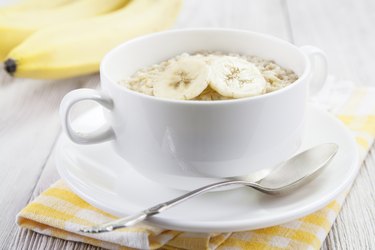
If you love to start the morning with a bowl of oatmeal, keep up the healthy habit. Oatmeal provides complex carbohydrates to help fuel your body and brain and houses a host of other important nutrients as well. Not all oatmeal is created equal, however, so some label reading is in order to ensure the most nutritious breakfast possible.
Complex Carbs, Simplified
Video of the Day
Despite the name, the concept of complex carbohydrates is fairly easy to understand. All carbohydrates are composed of sugar molecules; while simple carbs -- called "sugars" -- contain just one or two molecules, complex carbs -- which include starch and fiber -- contain three or more molecules. It takes longer for your body to break down and absorb complex carbs; in fact, your body can't break down fiber at all, so it passes through your body undigested. Starch and fiber are the main carbohydrates in oats, making oatmeal rich in complex carbs.
Video of the Day
Carbs in Your Body
When you eat a bowl of oatmeal, the starch delivers energy to your body, helping sustain you for the day's activities. The slower digestion, when compared to simple carbs, means that the energy will last, helping you avoid the cravings that often occur after sugar consumption. Because your body can't access the calories in fiber, it does not provide energy. However, you still need this important nutrient for digestive function, and fiber may also help maintain healthy cholesterol levels to protect your heart. The daily value for fiber in a 2,000-calorie diet is 25 grams, and most Americans fall short. The DV for total carbohydrates is 300 grams, and most of those should come from starch, not sugar.
Oatmeal Quality Matters
The ratio of complex to simple carbs in oatmeal changes drastically when you add sugar, which is why packaged, flavored oatmeal is less healthy than unflavored varieties. For example, a packet of one major brand's apple-cinnamon instant oatmeal contains 14.5 grams of sugar, 3.4 grams of fiber and 15.6 grams of starch. But a packet of this brand's unflavored instant oatmeal contains just 0.41 gram of sugar along with 4 grams of fiber and 23 grams of starch -- a much higher percentage of complex carbs. And although instant oatmeal contains the same nutrients as slower-cooking varieties, your body digests the carbs faster because they're more highly processed.
The Whole-Grain Difference
Not only does oatmeal provide complex carbohydrates, but it's a type of whole grain and is therefore more nutritious than refined grains such as corn flakes and white bread. Whole grains contain the bran, germ and endosperm of the grain, whereas refined versions only contain the endosperm. This means that whole grains contain more fiber, as well as B vitamins and other nutrients lost in grain processing. And unlike most grains, which require label reading to determine their whole status, oats are almost always sold in whole form.
- MedlinePlus: Carbohydrates
- University of Illinois College of Agricultural, Consumer and Environmental Sciences: What Are Complex Carbohydrates and Fiber?
- USDA National Nutrient Database: Cereals, Quaker, Instant Oatmeal Organic, Regular
- USDA National Nutrient Database: Cereals, Quaker, Instant Oatmeal, Apples and Cinnamon, Dry
- CNN Health: Is Instant Oatmeal Just as Healthy as Traditional?
- Harvard Health Publications: Health Gains From Whole Grains
- Grains & Legumes Nutrition Council: Oats
- MedlinePlus: Fiber
- U.S. Food and Drug Administration: Guidance for Industry: A Food Labeling Guide